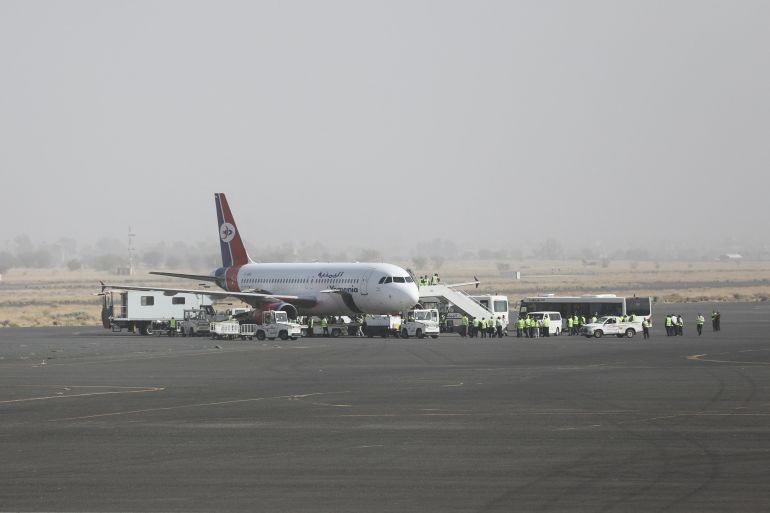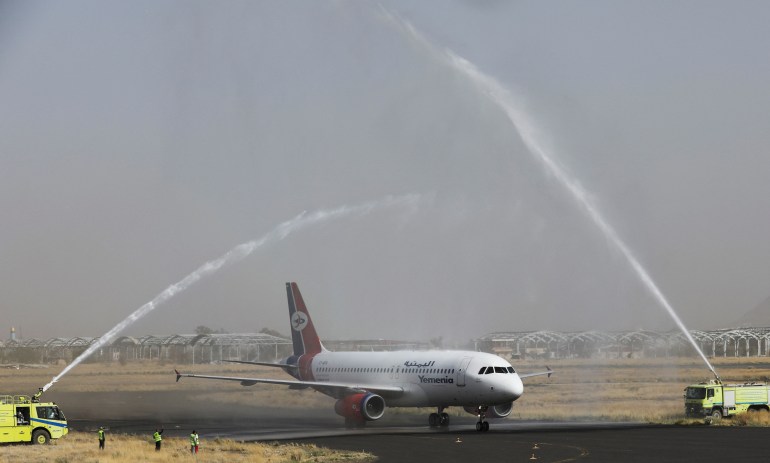First commercial flight in 6 years leaves Yemen’s capital Sanaa
The flight, carrying 137 passengers, is part of the UN-brokered, 60-day truce that the internationally-recognised government and the Houthi rebels struck last month.

The first commercial flight in nearly six years has taken off from Yemen’s rebel-held capital, a major step forward in a peace process that has provided rare relief from conflict.
The Yemenia plane carrying 137 passengers, including patients needing treatment abroad and their relatives, took off from Sanaa on Monday for the Jordanian capital, Amman, just after 9am (06:00 GMT).
Keep reading
list of 3 itemsTwo American women rescued from Houthi-rebel captivity in Yemen
First commercial flight out of Sanaa in six years postponed
Before the takeoff, the plane taxied through an honour guard of two fire trucks spraying jets of water.
Al Jazeera’s Mohammed al-Attab said it is a “joyful day” for many Yemenis, especially those who are in urgent need of medical treatment abroad.
“There are about 300,000 patients – according to the Houthi-run ministry of health – who are waiting for the resumption of flights because of the inability of most of the health sector here to treat them,” al-Attab said, speaking from Sanaa.
The flight was initially due to take off on April 24, but a dispute over passports issued by the Houthi rebels delayed it.
Last week Yemen’s government said it would allow citizens in rebel-held areas to travel on Houthi-issued passports, removing a barrier to the flights.
The government-run SABA news agency said last week that new Yemeni passports would be issued in Jordan for those arriving with Houthi-issued travel documents.
Sanaa’s airport has been closed to commercial traffic since August 2016 because of a blockade by the Saudi-led military coalition, which is fighting Iran-aligned Houthi rebels.
The conflict in Yemen, the Arab world’s poorest country, began in 2014, when Houthi rebels seized Sanaa. The Saudi-led coalition stepped in to support the government in 2015.
According to United Nations figures, more than 150,000 people have died in the violence and millions have been displaced, creating what it calls the world’s worst humanitarian crisis.
But a truce has been in place since April 2, coinciding with the start of the Muslim holy month of Ramadan.
Five days after it took effect, Yemen’s Saudi-based president handed his powers to a leadership council tasked with holding peace talks with the rebels.
Resuming flights from Sanaa, reopening roads to the rebel-besieged city of Taiz and allowing fuel tankers into the Houthi-held port of Hodeidah – a lifeline for Yemen – were all part of the agreement.
While fuel tankers have docked in Hodeidah and flights have now resumed from Sanaa, the main routes into Taiz remain cut off.
The inaugural flight under the truce had to be scrapped after Yemenia said it did not receive the necessary permits.
Each side blamed the other for the hold-up, while UN special envoy Hans Grundberg called for a quick resolution to the impasse.
The Norwegian Refugee Council (NRC) aid group said at the time that the inability to operate commercial flights out of Sanaa had stranded “tens of thousands of medical patients” seeking treatment abroad.

In a statement on Monday, NRC described the opening of the airport as a “stepping stone towards sustainable peace”.
“If the parties to the conflict continue to work together to operate regular flights in and out of Sanaa, they can help save thousands of lives, prevent premature deaths, and support the country’s economy,” said Erin Hutchinson, the aid group’s country director in Yemen.
“Yemenis will enjoy greater freedom of movement, and it will be quicker, easier, and cheaper to bring goods and aid into the country,” she added.